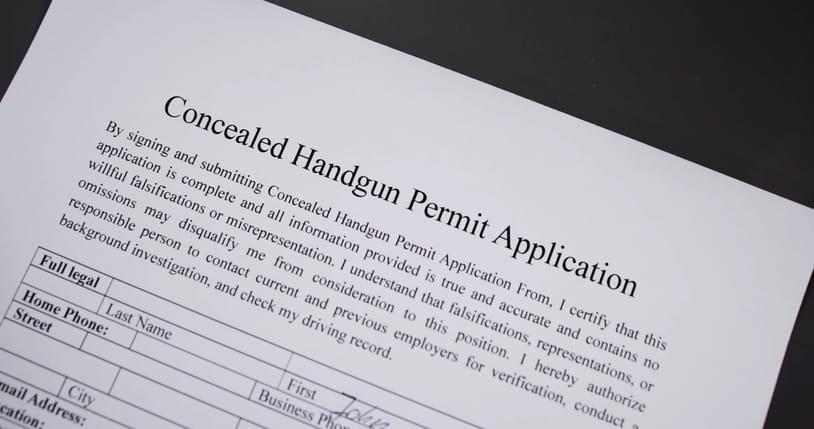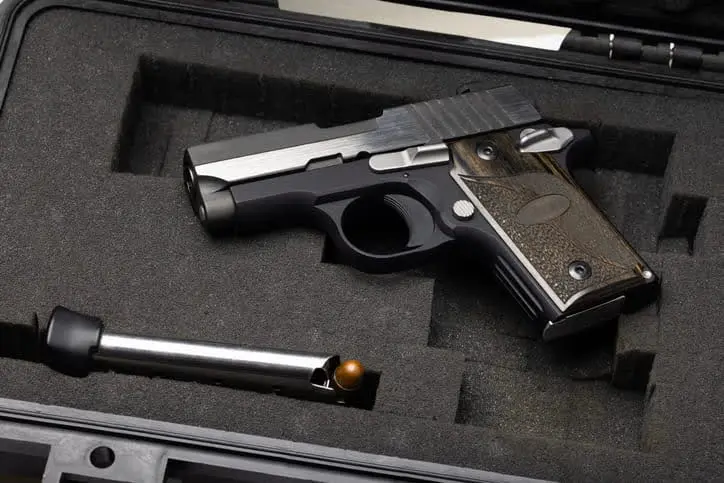How To Get a New Jersey CCW (Permit To Carry – PTC)
New Jersey’s permit to carry (PTC), often called a concealed carry weapon (CCW) permit, is the license that allows you to legally carry a handgun in public in NJ. Until a few years ago, obtaining a New Jersey CCW was notoriously difficult.
However, thanks to a 2021 United States Supreme Court ruling in the case of New York State Rifle & Pistol Association, Inc. v. Bruen, the state’s ability to deny PTC applications has been reduced. The result? Thousands of New Jersey residents are submitting NJ PTC applications, and those who are eligible are getting approved.
If you’re wondering how to complete your NJ PTC application, this PTC guide has all the answers you need so that you can exercise your Second Amendment rights.
Discover who is eligible, what documents and training you need, how to fill out the forms, and what to expect after applying.
How To Apply for a New Jersey PTC in Five Steps
Are you ready to apply for your New Jersey PTC? Take a closer look at each step you need to complete and what documents you’ll have to provide, as noted by the NJSP Concealed Carry Permits portal.
Step 1: Gather Required Documents
Before starting your online application, make sure you have:
- SBI Number
- Found on your NJ Firearms Purchaser ID Card
- Verify using NJSP Firearms Application and Registration System
- ORI Number
- The ORI number is the code for the processing agency
- Proof of NJ Residency
- Valid NJ ID
- Utility Bill
- Government Mail
- Recent Photo
- Light background
- Clear head-and-shoulders
- Training Certificates
- Upload scans or clear photos
- Including your signed certificate, SP182, instructors’ credentials, and qualification forms
- Personal Information
- 10-year address history
- SSN
- DL number
- Background Check
- Questions about criminal history, drug or alcohol abuse, or domestic violence restraining orders
- Four Character References
- Non-relatives you’ve known 3+ years; include full contact info (make sure all individuals know they’re being listed as character references)
- Full name, address, email, and phone number
- Handgun Information
- Make, model, serial number, caliber for each firearm
- If you have multiple handguns, list them all
- If you acquire a new handgun after getting your PTC, you will need to submit an additional form, specifically a SP 182A
- If you have multiple handguns, list them all
- Consent for Mental Health Records Search
- SP066 form completed electronically in the portal
- Payment Method
- Application and fingerprint fees total about $176
Step 2: Complete Your NJ PTC Application Online
When ready, begin your application on the NJSP Online Portal:
- Choose the correct ORI Number for your residence or jurisdiction
- Fill out your personal details and background questions
- Upload your photo and training documents
- Enter reference and handgun information
- Review everything carefully — accuracy is key
- Pay your application fee:
- $26 if applying through a municipal police ORI (balance paid later to PD)
- $176 total if applying under NJ State Police ORI
Step 3: Schedule Fingerprinting & Background Checks
- Schedule your fingerprints via IdentoGO NJ (within 90 days of application)
- If you already have an SBI number, re-fingerprinting may not be required
- Background checks include criminal and mental health history verification
- Expect processing to take about 60 days, depending on your local department’s volume
Step 4: Review, Approval, and Issuance
- Approved permits are issued electronically — check your email (and spam folder)
- Download or print your digital PTC to carry at all times
- If denied, review your email for the reason and consider your appeal options through the courts by working with a lawyer
- Pro Tip: Purchase METAL FID CCW
Step 5: Renewal & Ongoing Compliance
- Valid for 2 years from issue date
- Renew up to 120 days (4 months) before expiration through the same online portal
- Renewal cost and requirements are the same as initial application
- Always stay current on New Jersey CCW laws and training to maintain compliance
- Permit Expired? Renew today
- Explore the CCW SP182 Certification and Qualification Class
What Is New Jersey’s CCW (PTC) Permit?
In New Jersey, a “permit to carry a handgun” is the official term for a concealed carry license. This permit is required if you want to carry a handgun on your person in public, whether concealed or openly. While New Jersey’s PTC doesn’t distinguish between concealed and open carry in state statute, open carry in New Jersey is extremely discouraged. If you openly carry your firearm, it will almost certainly result in police contact and could lead to criminal charges for creating public alarm, a violation of N.J.S.A 2C:33-2.
The PTC is different from the NJ firearms purchaser identification card (FID) and the handgun purchase permit.
Here’s a comparison based on guidelines from the New Jersey State Police (NJSP):
- NJ Firearms Purchaser ID (FID): Needed to purchase firearms and handgun ammo in NJ and to own firearms in your home.
- NJ Handgun Purchase Permit: A one-time permit required for each handgun you buy in NJ.
- NJ Permit to Carry (CCW Permit): Allows carrying a handgun in public.
Buying a firearm is a separate process. Even if you have an FID and own guns, you must have a PTC to carry a handgun outside your home or property. However, you don’t need an FID or PTC to purchase long gun ammunition.
Importantly, out-of-state applicants do not need to first obtain an NJ FID or any other NJ permit in order to get a New Jersey carry permit. New Jersey’s carry permit stands on its own. However, you must already own the handgun you intend to carry. If you don’t own a handgun yet, do not apply for a PTC until you do.
You will be required to list the specific handgun(s) by make, model, and serial number on your application, and falsifying firearm ownership is a serious offense. In short, make sure you’ve lawfully acquired a handgun before starting the CCW application.
Who Can Get an NJ CCW?
New Jersey law requires applicants to be at least 21 years old, since you must be 21 to purchase a handgun. You must also not be prohibited from owning firearms, such as through a disqualifying criminal conviction or mental health disqualifications. You should be of sound mind and a law-abiding person as well.
Part of the application will involve a thorough background check and a mental health records check. You’ll also need to demonstrate good character via references and complete the required training. As long as you meet these qualifications and follow the steps, you have the right to obtain a CCW permit in New Jersey.
Prohibited Carry Locations
While the Bruen ruling made it harder for state officials to deny PTC applications, the state enacted extensive “sensitive places” restrictions where carrying is prohibited, including:
- Schools and school buses
- Government buildings
- Casinos
- Bars and restaurants that serve alcohol
- Private property without permission
- Public parks
- Entertainment venues
- Medical facilities
There are many other restricted places listed in N.J.S.A 2C:58-4.6. Even if you obtain your New Jersey CCW, you are not allowed to carry in any of these prohibited locations.
NJ Residents, Dual Residents, and Out-of-State Applicants
Where you live determines how you apply for the NJ carry permit. Here’s a breakdown according to the New Jersey State Police:
New Jersey Residents
If you live in New Jersey, you will apply through the police department that covers the jurisdiction of your NJ residence. For most, this means your municipal police department. If your town is patrolled by the State Police, you apply through the NJ State Police barracks.
If you have a part-time residence in New Jersey and can prove it, you are considered an NJ resident for this process. Dual residents must apply to the police department serving their NJ address, just like full-time residents. You cannot claim dual residency using a property you rent out to someone else; you must actually reside there.
Out-Of-State Non-Residents With No NJ Address
You can still apply for an NJ carry permit even if you live elsewhere and just travel to New Jersey. Non-residents will apply directly to the New Jersey State Police via the online system. You will not select a local police originating agency identifier (ORI) number since you have no NJ municipality of residence. Instead, the system will automatically assign your application to an NJSP station to process.
Otherwise, the requirements are the same as for in-state applicants, according to the New Jersey State Police guide for out-of-state residents. For example, you’ll need to complete the Civilian Carry Assessment and Range Evaluation (CCARE) protocol. The fees and documents are the same as well.
And speaking of out-of-state activities, New Jersey does not recognize permits from other states. Additionally, very few jurisdictions recognize NJ permits.
The Importance of Confirming Your Police Jurisdiction
You may wonder what an ORI is exactly. The originating agency identifier is basically an ID for each police department. NJ residents or dual residents must input the ORI of their local police department or state police station when starting the application. This ensures that your application goes to the correct agency for processing.
Double-check that you’ve used the exact ORI code for your town’s PD. Applying to the wrong ORI will send your application to the incorrect agency. These forms may be discarded or canceled with no refund.
If you’re not sure of the number, call your police police administrative line before you apply. If you select that you are an out-of-state applicant, the online system will skip the ORI field. You can also review this list of New Jersey ORI numbers to confirm which jurisdiction you fall under.
Required Firearms Training and Qualifications
New Jersey has strict training requirements that you must complete before you can apply for your CCW permit. Simply having prior experience or a permit from another state is not enough. You must meet New Jersey’s specific training criteria as well.
CCARE Qualification
The Civilian Carry Assessment and Range Evaluation (CCARE) protocol was implemented in 2023 to replace the Permit to Carry Safe Handling and Proficiency Qualification protocol. According to the NJSP, you’ll need to demonstrate the following to meet the CCARE protocol:
- The ability to safely handle a weapon
- Your proficiency in loading and unloading
- Proper concealed carry drawing technique
- The fundamentals of good marksmanship
You will be firing at an FBI-type Q target. The target may be made of cardboard or paper. You will be required to fire 50 rounds, and at least 80%, or 40 rounds, must impact within the border of the Q target’s silhouette during the course of fire. The course is untimed.
Additionally, you will perform several volleys of fire from different distances, including 3, 5, 6, 10, and 15 yards. This involves completing each 5-round volley twice at each distance. You’ll also be required to holster your firearm after each round of fire, and both revolvers and semi-automatic handguns are allowed.
Approved Instruction
It’s important to take your training with a certified firearms instructor. After you complete the range qualification and classroom portion, you can receive the following:
- Permit to Carry Safe Handling and Proficiency Certification: Demonstrates that you passed the NJ requirements.
- Instructor’s Certification: A copy of the instructor’s credentials proving that they are certified to teach the course.
You must upload both documents with your online application. Otherwise, it can be rejected or delayed.
Use of Force Education
As part of your training, you will receive education on the use of force. Your instructors will review justified use of force and applicable self-defense laws with you.
Make sure that you pay attention and take notes during this portion. If you are involved in a self-defense scenario while carrying a concealed handgun, you want to ensure you are following the law.
Firearm Safety and Awareness
The NJ online application will include a built-in review of firearms safety and awareness material. The State Police recommend reviewing this material ahead of time, as it’s quite dense. In short, expect to answer some safety questions during the process.
Once you complete the required NJ CCW training and qualification, it is valid for two years. You can use your initial training to meet the renewal requirements if you renew within two years. After your consecutive permit terms, which amount to approximately four years, you will need to qualify with a new course to renew again.
As a citizen who is exercising their Second Amendment rights, it’s a good idea to practice shooting and engage in additional training whenever possible. Also, ensure that you know how to clean, store, and maintain your firearm and ammunition.
A well-cared-for firearm will function reliably should you ever need to use it to protect yourself and your loved ones. Remember, in a high-stress scenario, you’ll fall to the level of your training, not rise to the occasion.
Ready To Get Your New Jersey CCW?
New Jersey’s process for obtaining a PTC is certainly more involved than many states. However, following these tips will help you successfully complete the permitting application process and exercise your Second Amendment rights.
Ready to get your PTC? The first step is to sign up for a qualifying course. Good luck, stay safe, and exercise your rights responsibly with your New Jersey carry permit.





